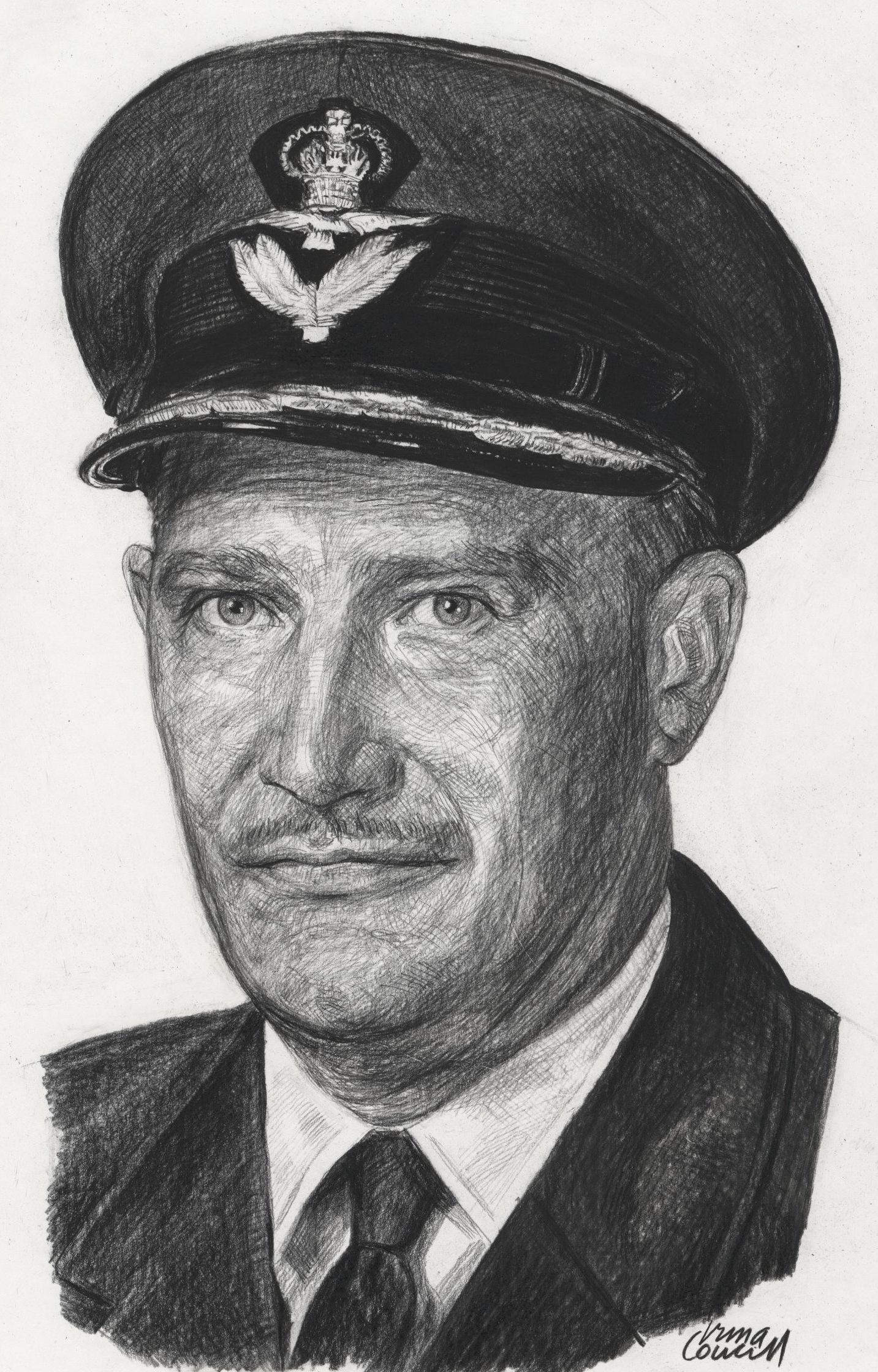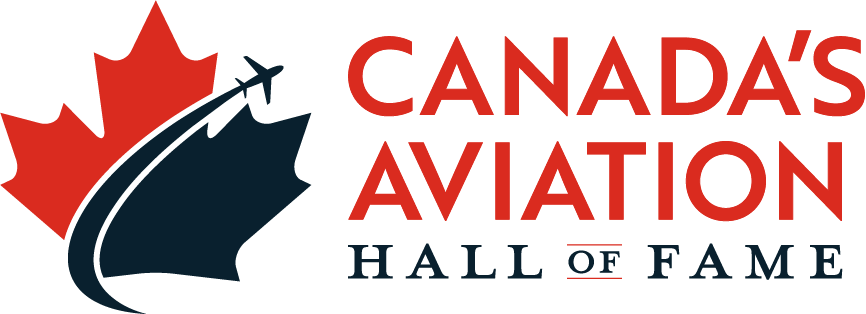Rayne Dennis Schultz

Birth Date: December 17, 1922
Birthplace: Bashaw, Alberta
Death Date: November 11, 2011
Year Inducted: 1997
Awards: DFC*; OMM; CD**; The McKee Trophy
Over many years in cooperation with the military and civilian agencies associated with aviation, his vision, dedication and pursuit of excellence resulted in significant advancement in air operations generally and flight safety accident prevention programs in particular.
Following His Dream
Rayne Dennis (Joe) Schultz, D.F.C.*, O.M.M., C.D.**, was born in Bashaw, Alberta, on December 17, 1922. In early 1941 at age 18, he realized his boyhood dream when he was accepted for pilot training by the Royal Canadian Air Force (RCAF). His initial flight training was on Tiger Moths at Sea Island, Vancouver, and he earned his wings on Avro Ansons at Macleod, Alberta. He was posted overseas in early 1942.
Flight Engineering
In England, he took flight engineer training before attending a Night Fighter (NF) Operational Training Unit (OTU) on Bristol Blenheims and Beaufighters. In late 1942, he joined No. 410 NF Squadron just as it was converting to the NF version of the DH Mosquito. He was to fly this versatile aircraft until the war ended.
Military Victories
During his first tour with No. 410 Squadron, he flew defensive patrols over England and night intruder missions into enemy territory. On the night of December 10/11, 1943, he and his Radio Observer (RO) F/L V.A. Williams, destroyed three Dornier bombers over the North Sea in less than fifteen minutes. Each received an immediate Distinguished Flying Cross (D.F.C.). By the end of their tour in June 1944, they had destroyed five enemy bombers. In December 1944, he rejoined No. 410 Squadron for a second tour in France and Holland. With his new RO, F/0 Jack Christie, three more enemy aircraft were destroyed over Germany, earning Schultz a Bar to his D.F.C.
Test and Ferry Flying
Before returning to Canada in August 1945, he completed an advanced weapons course to prepare for transfer to the Pacific Theater. The war against Japan ended, and Schultz was transferred back to Canada. He spent the next several years performing test and ferry flying from St. Hubert, Quebec, Rockcliffe and Trenton, Ontario.
The Blue Devils
In 1948 the RCAF began to rebuild, with the de Havilland Vampire Jet heralding a new era. As an experienced fighter pilot, Schultz was selected for training at No. 1 Fighter OTU. This became the re-formed No. 410 Fighter Squadron in January 1949. A few months later Schultz and three others formed the first official RCAF jet aerobatics team, the Blue Devils.
Avro
In June 1950, he left No. 410 Squadron on an exchange posting with the Central Fighter Establishment in England. He returned to North Bay, Ontario, where the newly established No. 3 All Weather (AW) OTU was about to be equipped with the Canadian Avro-built CF-100 'Canuck'. His two-year tour there as the Chief Flying Instructor was followed by four years as Staff Officer, Operations, at Air Defence Command (ADC) Headquarters. One of his more important responsibilities in this capacity was as the ADC pilot representative on the Avro Arrow program.
The CF-101 Voodoo
When the CF-105 Avro Arrow was cancelled, Schultz was reassigned to Bagotville, Quebec, first as Squadron Commander of No. 413 AW Squadron, then as Chief Operations Officer and finally as Commander of No. 432 AW Squadron. In mid 1961, he was named to lead the air crew team to work with the United States Air Force (USAF) for training on the CF-101 Voodoo which was to re-equip the All-Weather squadrons in place of the Arrow. This group re-formed as No. 425 AW Squadron at Namao, Alberta, and was responsible for converting the other AW Squadrons to the Voodoo. As soon as this task was completed, Schultz was sent to No. 4 Fighter Wing in Germany as Chief Operations Officer, to prepare for the arrival of the CF-104 Starfighter which was assigned to a nuclear strike role with the North Atlantic Treaty Organization (NATO). Both of these high profile and demanding programs received international recognition, bringing credit to the RCAF and Canada.
Chief Accident Investigator
A transfer in 1966 to the Directorate of Flight Safety in Ottawa, as Chief Accident Investigator, ended his operational flying but he maintained full flying status until retirement. With promotion to Group Captain in 1977, he became Director, Flight Safety. Over the next ten years he developed and managed one of the most highly regarded flight safety programs. In recognition of this and previous exceptional service he was appointed an Officer in the Order of Military Merit (O.M.M.) in 1974.
Group Captain Schultz was convinced that an aggressive accident prevention program would save lives and enhance operational effectiveness. He used his extensive experience, integrity and determination to convince much of the aviation community that a major change in philosophy was needed. Accordingly, he reduced the threat of 'blame and punishment' and wherever possible, give privileged status to flight safety reports. Almost immediately, a significant increase in accident reports showed that there was a new trust in the system and an acceptance of the principle that complete and candid reports were a key factor in prevention. Even a simple step, such as replacing the harsh, derogatory word 'ERROR', had an immediate and positive effect on attitudes.
Honours and Recognition
Schultz's efforts in the field of accident prevention were recognized internationally in 1977 by a special award from the International Flight Safety Foundation in 1977 and honorary membership in the USAF Aerospace Safety Hall of Fame. He was awarded the Trans-Canada (McKee) Trophy for 1978 for his work in promoting flight safety. After more than thirty-six years of continuous service, he retired in 1977 as Group Captain and died in 2011.
Joe Schultz made other tangible contributions to flight safety. These stemmed from his dynamic support of the development of such far-reaching programs as flight data recorders, crash position indicators, reduction of bird hazards to aircraft, and a means of reducing the vulnerability of helicopters to wire strikes
Rayne Dennis (Joe) Schultz was inducted as a Member of Canada's Aviation Hall of Fame in 1997 at a ceremony held in Calgary, Alberta.
To return to the Inductee Page, please click here.
